'Modi, with his sharply honed political savvy and undoubted grasp of international affairs, is a past master at taking the measure of world leaders.'
'He would be the last person to think of the unpredictable and not too well-regarded Trump as the mediator,' says B S Raghavan.
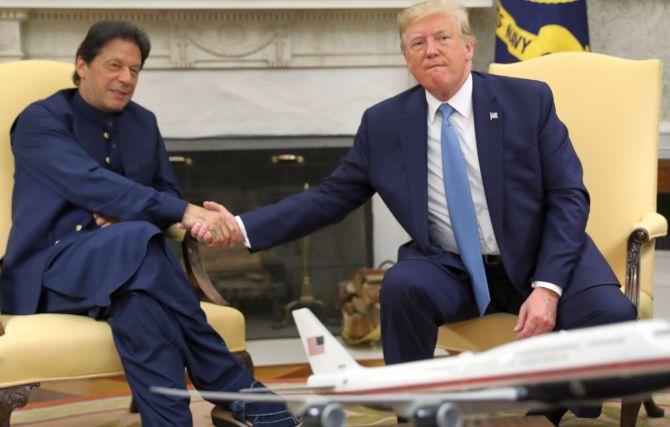
US President Donald J Trump's claim at the media conference following his meeting with Pakistan Prime Minister Imran Ahmed Khan Niazi that Prime Minister Narendra Damodardas Modi had invited him to 'mediate' in the dispute over Jammu and Kashmir between India and Pakistan during their meeting a fortnight ago in Japan, presumably during the bilateral meeting at the sidelines of the G-20 summit at Osaka, has expectedly caused a raging political storm in India.
For political parties which had been feeling benumbed and feeling like throwaways after being so trenchantly trounced by the Bharatiya Janata Party and for Modi-bashers in general, this has been a godsend of an opportunity to haul Modi over the coals for all it is worth in and outside Parliament.
The deadpan denial by the staid Minister of External Affairs S Jaishankar, unused to handling turmoil in the House, has done little to allay the suspicion of some such exchange having taken place between Trump and Modi.
Apart from every other consideration, what makes such a request by Modi to Trump most unlikely, if it doesn't rule it out altogether, is the fact that Modi, by now, with his sharply honed political savvy and undoubted grasp of international affairs, is a past master at taking the measure of world leaders.
He would be the last person to think of the unpredictable and not too well-regarded Trump as the mediator.
Then, what made Trump throw the bombshell?
He was the one who has been railing unceasingly during his election campaign and his term of office against fake news and alt-fact and has been crusading against them with all his might. Would he, then, himself palm off fake news on the world on such a sensitive issue at a meeting with the eyes of the entire world on it?
Has he been delusional in making the claim?
Has he misunderstood some innocuous words of Modi to the effect, say, that Trump could help by arm-twisting Pakistan to bring the dispute to an end?
Or, being a born-again Christian, Trump wanted to live up to the call of the Bible, 'Blessed are the peace makers, for they shall be called the Children of God!' by pulling off diplomatic legerdemain, hoping it would start a process of out-of-the-box thinking?
Or was it that he had in mind the precedent of two instances of US intervention and mediation in the seemingly interminable Israeli-Palestinian conflict holding many similarities with the India-Pakistan dispute, resulting in the loss of thousands of lives on both sides and draining trillions of dollars from out of the resources of the fledgeling States, and was carried away by the grandiose vision of leaving his mark on history?
Trump must know, however, that in both instances the efforts were still born.
The former, in which then US President Jimmy Carter brought then Egyptian president Anwar Sadat and then Israeli prime minister Menachem Begin to the negotiating table at Camp David and helped arrive at the accords bearing that name. This failed to takeoff in actual practice.
The latter, held at Camp David again, in which then US president Bill Clinton really arm-twisted then Israeli prime minister Ehud Barak and then Palestine Authority chairman Yasser Arafat, ended without any agreement but with a trilateral statement laying down some lofty, platitudinous principles to guide future negotiations.
I suspect Trump was carried away by Imran Khan's reported pathetic plea that Trump would have the prayers of over a billion people if he could mediate or resolve this issue, and came out with a fanciful response. Knowing Trump, it is not improbable if he believed it to be true.
Leaving the imbroglio aside, let us come to brass-tacks.
The dispute has been dragging on for 70 years and has become a festering sore. I have visited Jammu and Kashmir several times from 1952 to 1972 and seen how a state known for a sweet, ever-smiling, friendly populace has become infested by militants and terrorists.
The two countries have fought wars which they could ill afford and are spending a sizeable part of their resources on security operations at the cost of their economic development.
If the same amount had been invested for the betterment of their peoples, both countries would have been at the pinnacle of progress and prosperity.
There have been talks galore, but all essentially the dialogues of the deaf.
The one person who had the moral authority, unchallengeable credibility and world stature to solve the problem was Jawaharlal Nehru and in his last days, he released Sheikh Abdullah from his unjustified imprisonment, and sent him to Pakistan with a proposal for resolution.
I was at that time in charge of the political division in the ministry of home affairs, dealing with Jammu and Kashmir, among other matters.
Though I can't assert it for sure, the proposal was for a condominium (defined in international law as a political territory (state or border area) in or over which multiple sovereign powers formally agree to share equal dominium (in the sense of sovereignty) and exercise their rights jointly, without dividing it into 'national' zones.)
Whatever it be, Nehru died while Sheikh Abdullah had just arrived in Pakistan, and he had to hastily return and the one attempt that could have led somewhere ended abruptly.
In the 1990s, another widely respected statesman and a Bharat Ratna, C Subramaniam, boldly chose to bite the bullet, on the strength of belonging to the South with no prior political baggage and fixations, to write a series of letters (which I drafted) to then President K R Narayanan, then prime ministers I K Gujral and Atal Bihari Vajpayee enumerating the possible hypothetical courses open to both countries such as i. prolonging the stalemate in the hope of wearing out the resistance and militancy over whatever time it took, and whatever outgo of human, material and monetary resources it involved, ii. referendum in the whole state, iii. referendum held separately in the Kashmir valley, Jammu and Ladakh, or iv. reference to arbitration as provided for in Article 51 of the Constitution itself which states:
'Promotion of International peace and security
The State shall endeavour to:
a. promote international peace and security;
b. maintain just and honourable relations between nations;
c. foster respect for international law and treaty obligations in the dealings of organised peoples with one another; and
d. encourage settlement of international disputes by arbitration.'
In the same letters, he gave as his personal opinion that the one solution which might bear fruit was to invite eminent, respected and independent world statesmen of the calibre of, say, James Callaghan, Jimmy Carter and Mikhail Gorbachev, to apply their minds singly or together in a study group to the issue and act on what they considered to be an equitable means of resolving it.
C Subramaniam also met Narayanan, Gujral and Vajpayee a few times. They gave him a patient hearing without rejecting his approach outright. Gujral actually wrote him a letter appreciating his initiative and promising to give it due consideration.
Seventy years after Independence are too long a time for two countries suffuse with the wisdom of millennia to remain bogged down in a dispute in an era when trillions are transacted around the globe eight times a single second at the click of a mouse.
Trump is right at least in one observation he made after his meeting with Khan: 'It is impossible to believe that two incredible countries who are very, very smart with very smart leadership can't solve a problem like that!'
For that to happen, anyone who leads a democracy must display courageous leadership without adhering to dictates of party interests, political correctness and public opinion, but instead shape and prepare the people for bold initiatives in the nation's interests: Working for the well-being of posterity and not for winning the next elections.
Is Narendra Damodardas Modi capable of such an intrepid leadership is the question.
If at all anyone or any party can arrive at a rapprochement with Pakistan, it is Modi and his party, for it is they who command the necessary credentials to carry conviction whatever settlement they arrive at that they have not betrayed the nation's interests, just as it was only then US president Richard M Nixon who, with his anti-Communist past, was best fitted to break the decades long impasse with China and create history.
B S Raghavan is a former member of the Indian Administrative Service who was director, political and security policy planning and member of the joint intelligence council in the central government when Jawaharlal Nehru, Lal Bahadur Shastri and Indira Gandhi were prime ministers, and dealt with security issues arising out of 1965 war with Pakistan.
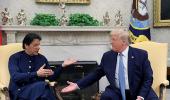
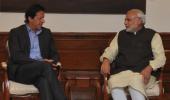
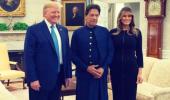
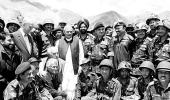




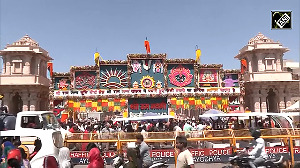


 © 2025
© 2025